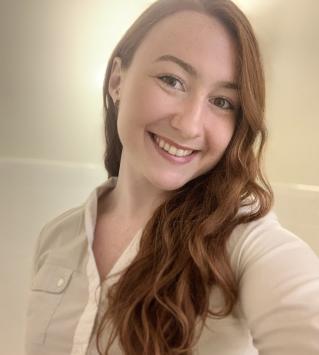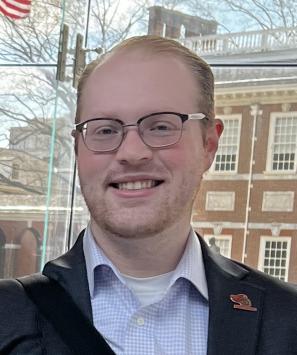Research Cafe: Courtney R. McDermott, Geordan Stukey & Sandra Manfreda
Event Description
Research Cafe: April 3, 2024
3:00 - 4:00pm
On Zoom
Register in advance to receive the Zoom link
1.) "Early life alterations to the gut microbiome and its effects on neurodevelopment and behavior" by Courtney R. McDermott

Abstract: Neurodevelopmental disorders (NDDs) affect the lives of >17% of children in the United States. A recently identified factor that has been linked to increased NDD outcomes is exposure to cephalosporin antibiotics during the first two years of life, when neurogenesis, the process by which neural precursors proliferate, migrate, and differentiate into specialized cells of the brain, predominates. Extensive research indicates that antibiotic exposure decreases the diversity of gut bacteria, which may consequently alter adult brain structure and function. However, little is known about effects on neurogenesis, identified as a point of convergence in NDD pathogenesis. Our studies use a novel gene x environment model to determine how cephalosporin exposure alters postnatal neurogenesis and behavior in the genetically vulnerable 16p11.2 microdeletion (16pDel) mouse. To model antibiotic exposure during infancy, wildtype and 16pDel littermates were exposed to saline (control) or the cephalosporin, cefdinir, from postnatal days 5-9. We found significant reductions in the gut microbiome composition of all cefdinir-exposed mice, with a selective reduction in hippocampal neurogenesis in 16pDel male mice. Additionally, all cefdinir-exposed mice had reduced sociability, which was exacerbated in the 16pDel mice. In summary, these data collectively support our hypothesis: early life cefdinir exposure perturbed the gut microbiome and selectively dysregulate neurogenesis and behavior in 16pDel mice.
Speaker Bio: Courtney R. McDermott is an NIH D-SPAN Scholar and Neuroscience PhD Candidate who has personal and professional interests in investigating the pathogenesis of neurodevelopmental disorders. She is mentored by Dr. Emanuel DiCicco-Bloom and co-mentored by Dr. Martin Blaser. Her dissertation examines the effects of early-life antibiotic exposure on the gut microbiome and neurogenesis in 16p11.2 microdeletion mice. Outside of the laboratory, Courtney is highly involved in science outreach. She is a member of the Rutgers School of Graduate Studies Diversity, Equity, and Inclusion Graduate Student Advisory Committee, volunteers at the Rutgers Center for Adult Autism and Services, and is the Neuroscience Graduate Mentor Fellow for the Rutgers Honors College.
2.) "PA phosphatase Pah1 contains a novel RP domain that regualtes its phosphorylation and function in yeast lipid synthesis" by Geordan Stukey

Abstract: The yeast enzyme responsible for partitioning a key lipid precursor molecule between membrane lipids and energy storage lipids is regulated by modifications to the enzyme. Using a variety of techniques, I have discovered a new domain in the enzyme that influences the ability of the enzyme to be modified. Despite this enzyme being evolutionarily well conserved from fungi to mammals (including humans), this domain is not found in the human version of the enzyme. Because this domain is unique to fungi, it represents a potential therapeutic target for opportunistic fungal pathogens.
Speaker Bio: I was born and raised in southwest Michigan. I completed my undergraduate degree in Biology from Hope College. I moved to Rutgers University following that to enter the Microbial Biology PhD program and work with Dr. George Carman. In my free time I am a book collector, coffee fiend, and avid cinephile.
3.) "Do They Like Me? The implication of (Meta-)Stereotypes on Inter-gendered Interactions In STEM" by Sandra Manfreda
Abstract: This research examines the content and implications of gendered-STEM stereotypes (i.e., stereotypes about women in STEM) and gendered-STEM meta-stereotypes (i.e., stereotypes that women in STEM believe that others hold towards them) on intergroup interactions in STEM settings. Previous work has documented the content of stereotypes held by men about women in STEM, across various dimensions. We extend this work by 1) documenting the content of both stereotypes and meta-stereotypes among women in STEM (i.e., what others believe about women in STEM and what others believe about you, as a woman in STEM), 2) investigating how women’s STEM identification (high v. low) informs intergroup perceptions, and 3) examining how (meta-)stereotypes might undermine intergroup interactions. We predict that gendered-STEM stereotypes and meta-stereotypes will differ among high STEM-identified women, and these meta-stereotypes will be stronger when considering outgroup (men) v. ingroup (women) perceivers. Finally, we hypothesize that stronger meta-stereotypes among high STEM-identified women will predict lower comfort, more negative feelings, and less friendship potential towards perceivers. Ultimately, this work will help inform our understanding of the barriers to positive intergroup interactions in STEM environments and implications for solutions.
Speaker Bio: I am a graduate student in the Social Psychology Ph.D. program at Rutgers University. My work is centered around social identity threat and intergroup contact. Specifically, I am interested in examining how stereotypes and meta-stereotypes (i.e., perceptions that an individual believes out-group members hold about them) of minoritized individuals interfere with positive intergroup interactions. One line of my research assesses the meta-stereotypes of women in STEM and how that effects their interactions with dominant group members (e.g., men) within STEM field. The second line of research focuses on leverages VR technology to explore behavioral and affective responses to interracial interactions.
About Research Cafe
Research Café brings together the entire graduate student community of Rutgers University-New Brunswick/Piscataway campus to strengthen scholarly literacy and interdisciplinary research communication by providing a platform for budding researchers to connect, share their in-progress research or scholarship, and benefit from peer feedback in a friendly and low-stakes setting.
Research Café is a monthly, one-hour event to occur entirely online during the Spring 2024 semester. Each event will feature:
- Presentations (10-12 min. each) from 2-3 graduate students from across disciplinary areas ranging from engineering and biology to history and anthropology.
- A Q&A dialogue with peers and attendees.
Sign up to attend in person or on Zoom at https://grad.rutgers.edu/research-cafe.
---
Questions? Contact the program coordinators:
Briana Bivens at bb770@grad.rutgers.edu and Ramazan Güngör at rg835@grad.rutgers.edu.